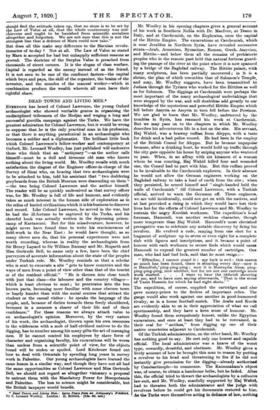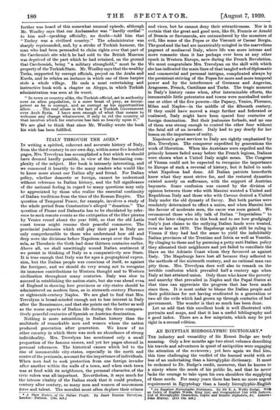DEAD TOWNS AND LIVING MEN.*
EVERYONE has heard of Colonel Lawrence, the young Oxford archaeologist who showed veritable genius in organizing the undisciplined tribesmen of the Hedjaz and waging a long and successful guerilla campaign against the Turks. We have the greatest admiration for Colonel Lawrence, but it would be wrong to suppose that he is the only practical man in his profession, or that there is anything paradoxical in an archaeologist who becomes a soldier and a diplomatist. The brilliant little book which Colonel Lawrence's fellow-worker and contemporary at Oxford, Mr. Leonard Woolley, has just published will undeceive those who think that an "antiquary "—as the author calls himself—must be a dull and tiresome old man who knows nothing about the living world. Mr. Woolley recalls with much satisfaction the disgust of the Engineer officer-in-charge of the Survey of Sinai who, on hearing that two archaeologists were to be attached to him, told his assistant that "two doddering greybeards from the British Museum were descending on them —the two being Colonel Lawrence and the author himself. The reader will be as quickly undeceived as that survey officer was, for Mr. Woolley is full of life and humour, and evidently takes as much interest in the human side of exploration as in the relics of buried civilizations which it is his business to discover and record. Like Colonel Lawrence, he served in the war, but he had the ill-fortune to be captured by the Turks, and his cheerful book was actually written in the depressing prison- camp of Kastamuni. But for this misadventure, however, he might never have found time to write his reminiscences of field-work in the Near East : he would have thought, as so many clever men do, that his personal experiences were not worth recording, whereas in reality the archaeologists from Sir Henry Layard to Sir William Ramsay and Mr. Hogarth and Miss Gertrude Bell, to name only a few, have been the chief purveyors of accurate information about the state of the peoples under Turkish rule. Mr. Woolley reminds us that a scholar who is sent to excavate a site "gets to know countries and the ways of men from a point of view other than that of the tourist or of the resident official." "He is thrown into close touch with just that class—the labourer and the country villager— which is least obvious to most ; he penetrates into the less known parts, becoming more familiar with some obscure town or lonely hamlet than with the social centres that attract the student or the casual visitor : he speaks the language of the people, and, because of duties towards them freely shouldered, becomes in a measure a sharer of their life and of their confidence." For these reasons we always attach value to an archaeologist's opinion. Moreover, by the very nature of his work, the archaeologist, thrown upon his own resources in the wilderness with a mob of half-civilized natives to do the digging, has to number among his many gifts the art of managing men. If he cannot control his employees by sheer force of character and organizing faculty, his excavations will be worse than useless from a scientific point of view, for the objects found will be stolen or spoiled. Lord Kitchener found out how to deal with Orientals by spending long years in survey work in Palestine. Our young archaeologists have learned the same lesson in a similar way, and though they have not all had the same opportunities as Colonel Lawrence and Miss Gertrude Bell, we should not regard as altogether visionary a proposal to entrust them with the Mandatory Power for Mesopotamia and Palestine. The loss to science might be considerable, but the British taxpayer would benefit.
* Dead Towns and Living Man: &sing Page* front an Antiquary's Notebook. By C. Leonard Woolley. London : H. Milford. [1ita. 6d. net.]
Mr. Woolley in his opening chapters gives a general account of his work in Southern Nubia with Dr. MacIver, at Teano in Italy, and at Carchemish, on the Euphrates, once the capital of the Hittite Empire. The excavations at Carchemish, which is near Jeritblus in Northern Syria, have revealed successive strata—Arab, Armenian, Byzantine, Roman, Greek, Assyrian, and Hittite—and below them all the remains of prehistoric peoples who in the remote past held this natural fortress guard- ing the passage of the river at the point where it is now spanned by a bridge of the Baghdad railway. The Hittite palace, with
many sculptures, has been partially uncovered ; in it is a shrine, the plan of which resembles that of Solomon's Temple, and may, Mr. Woolley suggests, have been transmitted to
Judaea through the Tyrians who worked for the Hittites as well as for Solomon. The diggings at Carchemish were perhaps the most important of the many archaeological undertakings that were stopped by the war, and will doubtless add greatly to our knowledge of the mysterious and powerful Hittite Empire which fell before Assyria as Assyria in turn fell before the Persians.
We are glad to learn that Mr. Woolley, undeterred by the troubles in Syria, has resumed his work at Carchemish. But we may pass on to the chapters in which Mr. Woolley describes his adventurous life in a hut on the site. His servant,
Haj Wahid, was a brawny ruffian from Aleppo, with a taste for drink and a bad police record. He had been in the employ of the British Consul for Aleppo. But he became unpopular because, after a drinking bout, he would hold up traffic through the city gate opposite his house by sniping anyone who ventured to pass. When, in an affray with six kinsmen of a woman whom he was courting, Haj Wahid killed four and wounded one, the Consul had to part with him. But this ruffian proved to be invaluable to the Carchemish explorers. In their absence he would not allow the German engineers working on the Baghdad railway to take a load of earth from the sits; when they persisted, he armed himself and "single-handed held the walls of Carchemish" till Colonel Lawrence, with a Turkish official, arrived to warn the Germans off. These engineers, we are told incidentally, could not get on with the natives, and at last provoked a rising in which they would have lost their lives but for the efforts of Colonel Lawrence and Mr. Woolley to restrain the angry Kurdish workmen. The expedition's head foreman, Hamoudi, was another reckless character, though more temperate than Haj Wahid. Hamoudi's most cherished prerogative was to celebrate any notable discovery by firing his revolver. He evolved a code, ranging from one shot for a fragment of sculpture up to seven or even eight for a complete slab with figures and inscriptions, and it became a point of honour with each workmen to secure finds which would cause Hamoudi to expend the greatest number of cartridges. One man, who had had bad luck, said that he must resign :—
" Effendim, I cannot stand it : my luck is evil : this season so much has been found, there is shooting every day—now it is Herat:1661V ping-ping-ping ; now it is Mustapha Aissa, ping- ping-ping-ping, now another, but for me not one cartridge since work started. . . . I want to hear the clawish shooting for me, and to have men saying afterwards, That is the stone of Yasin Hussein for which he had eight shots.'" The expedition, of course, supplied the cartridges and also gave money-prizes to the finders of important relics. The gangs would also work against one another in good-humoured
rivalry, as in a house football-match. The Arabs and Kurds are evidently akin to us in their appreciation of what we call sportmanship, and they have a keen sense of humour. Mr. Woolley found them scrupulously honest, unlike the Egyptian excavators, and once at least they had to be restrained, in their zeal for " antikas," from digging up one of their native cemeteries adjacent to Carchemish.
Of the Turkish administration, on the other hand, Mr. Woolley has nothing good to say. He met only one honest and capable official. The local administrator was a knave of the worst type, cowardly, deceitful, and obstinate. Mr. Woolley gives a lively acoount of how he brought this man to reason by putting a revolver to his head and threatening to fire if he did not instantly give permission for the digging—already authorised by Constantinople—to commence. The Kaimmakam's object was, of course, to obtain a handsome bribe, but he failed. After this, the official tried to thwart the archaeologists by a collusive law-suit, and Mr. Woolley, manfully supported by Haj Wahid, had to threaten both the administrator and the judge with revolvers before he could get his documents restored to him. As the Turks were themselves acting in defiance of law, nothing further was heard of this somewhat unusual episode, although Mr. Woolley says that our Ambassador was "hardly cordial" to him and—speaking officially, no doubt—told him that "Turkey was a civilized country." The administrator was sharply reprimanded, and, by a stroke of Turkish humour, the man who had been persuaded to claim rights over that part of the Carchemish site whkh he had sold to the British Museum was deprived of the part which he had retained, on the ground that Carchemish, being "a military stronghold," must be the property of the Turkish State. Mr. Woolley says that the wealthy Turks, supported by corrupt officials, preyed on the Arabs and Kurds, and he relates an instance in which one of these harpies stole a whole village. He ends a most entertaining and instructive book with a chapter on Aleppo, in which Turkish administration was seen at its worst.
"In town or country alike, the Turkish official, set in authority over an alien population, is a mere beast of prey, as incom- petent as he is corrupt, and as corrupt as his opportunities allow. . . . The real abuse is the fact of a Turkish Government over Arab Syria. I have seen enough of what that means to welcome any change whatsoever, if only to rid the country of that incubus which for centuries has lain so heavily upon it."
We are glad to think that since Mr. Woolley wrote the book his wish has been fulfilled.



































 Previous page
Previous page